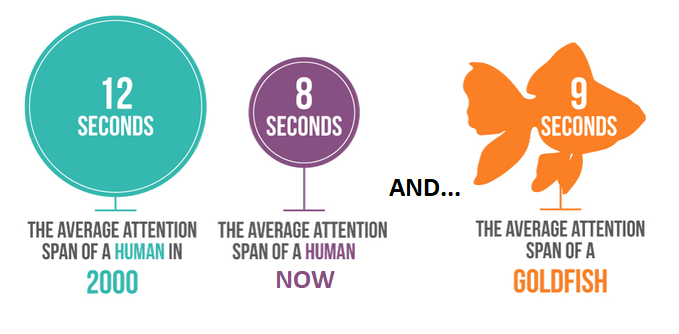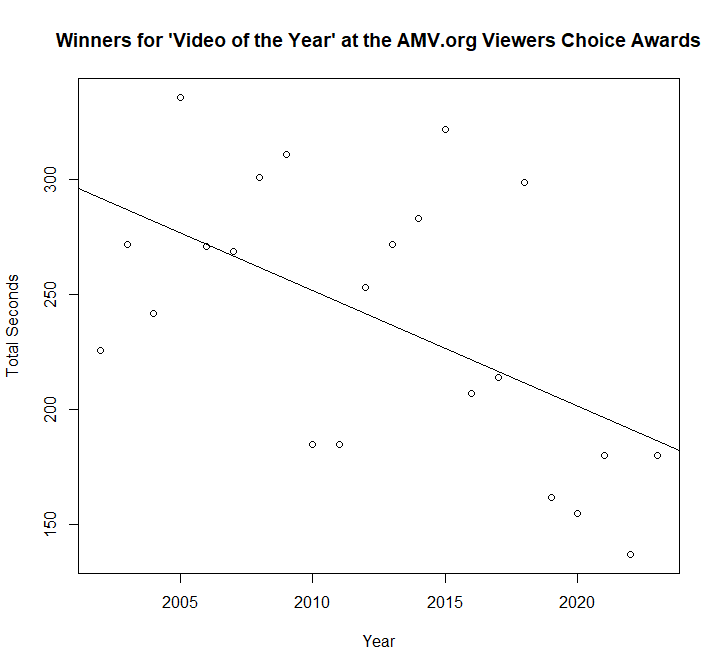Conventional wisdom seems to say that attention spans are getting shorter. We all feel the siren song of our phone these days, and can remember a time when we were able to focus on things for longer. But is there a way to confirm this? If you google this question, you'll get this dubious infographic:

As far as I can tell, these figures are completely made up. Goldfish apparently don't even have short attention spans (and their memory is excellent!). And it's absurd to think of our attention span as something that can be summed up in a single number; we can focus on easy/interesting tasks for hours at a time, while difficult/boring tasks are much harder.
Searching google scholar didn't seem to find anything about attention spans over time (is no one actually researching this?). I got frustrated trying to find any research at all on this question, and ultimately decided to see if I could find an answer myself. That's why, this Father's Day, I spent 3 hours writing down the lengths of "Video of the Year" finalists for AMV.org's Viewers Choice Awards. The VCAs go back all the way to 2002, and all of the finalists are publicly available across all 22 years that the contest has been run. This makes it a nice dataset for seeing if the length of an average finalist has decreased.
A valid criticism of this mini-study is that I'm not directly measuring attention span. I'm measuring "AMV duration preference in the amv.org community," which is possibly related to attention span, but at best can only serve as a rough surrogate for it.
The DATA
All years had between 5 to 7 finalists. The longest "Video of the Year" finalist in my dataset was 2005's Whisper Of The Beast (amv.org entry), a 6 minute 33 second long Naruto AMV set to three separate songs, with the longest song by German Industrial band, Megaherz. Ah, industrial, those were the days.
The shortest AMV was actually one of my favorites in recent years: 2022's Truck-kun x Train-chan: Get Wrecked, by TheLazyDaze. It's amazing:
A lot of AMVs had credit bumpers - separate sections that listed things like beta testers, music used, source used, etc. These were not counted toward an AMV's runtime. There was some subjectivity here on my part on what counted as a "bumper" that hopefully didn't end up mattering much.
The Results
Here's a scatterplot with a line of best fit through it. It's messy, but you can probably eyeball a small downward trend.

r = 0.3137 and p = 0.000459 indicate a weak but highly significant correlation. The average finalist AMV length declined 2.85 seconds per year. According to the line of best fit, predicted length of a finalist was 4 minutes, 8 seconds in 2002 and 3 minutes, 7 seconds in 2023. In other words, the average length of a finalist video went down by a full minute. As someone who was interested in the scene in the early 2000s, and then took a long break before returning in 2020, this matches my subjective experience of contest winning AMV lengths.

r = 0.5528 and p = 0.00762 indicate a moderate and still significant correlation. The average winner AMV length declined at a rate almost twice as fast as the average finalist, at 5.025 seconds per year. Also of note is that the line of best fit does not appear to slice through the data particularly well. The winners in the last 5 years are all below the line of best fit - they are even shorter than predicted! This is partly because of an apparent outlier, 2018's 5 minute AMV, Sunlight:
What conclusions should we draw from these results?
If we are to buy the argument that "preference for length of AMVs" can be used as a surrogate for "attention span," it seems like our attention span has indeed declined in the last 21 years. I expect this trend to continue. If we make the (probably false) assumption that the decline in duration continues at the same rate for the next 10 years, we can predict that that in 2033 the average VCA Video of the Year finalist will be 2 minutes, 39 seconds, and the average winner will be 2 minutes, 16 seconds.
As far as I can tell, these figures are completely made up. Goldfish apparently don't even have short attention spans (and their memory is excellent!). And it's absurd to think of our attention span as something that can be summed up in a single number; we can focus on easy/interesting tasks for hours at a time, while difficult/boring tasks are much harder.
Searching google scholar didn't seem to find anything about attention spans over time (is no one actually researching this?). I got frustrated trying to find any research at all on this question, and ultimately decided to see if I could find an answer myself. That's why, this Father's Day, I spent 3 hours writing down the lengths of "Video of the Year" finalists for AMV.org's Viewers Choice Awards. The VCAs go back all the way to 2002, and all of the finalists are publicly available across all 22 years that the contest has been run. This makes it a nice dataset for seeing if the length of an average finalist has decreased.
A valid criticism of this mini-study is that I'm not directly measuring attention span. I'm measuring "AMV duration preference in the amv.org community," which is possibly related to attention span, but at best can only serve as a rough surrogate for it.
The DATA
All years had between 5 to 7 finalists. The longest "Video of the Year" finalist in my dataset was 2005's Whisper Of The Beast (amv.org entry), a 6 minute 33 second long Naruto AMV set to three separate songs, with the longest song by German Industrial band, Megaherz. Ah, industrial, those were the days.
The shortest AMV was actually one of my favorites in recent years: 2022's Truck-kun x Train-chan: Get Wrecked, by TheLazyDaze. It's amazing:
A lot of AMVs had credit bumpers - separate sections that listed things like beta testers, music used, source used, etc. These were not counted toward an AMV's runtime. There was some subjectivity here on my part on what counted as a "bumper" that hopefully didn't end up mattering much.
The Results
Here's a scatterplot with a line of best fit through it. It's messy, but you can probably eyeball a small downward trend.

r = 0.3137 and p = 0.000459 indicate a weak but highly significant correlation. The average finalist AMV length declined 2.85 seconds per year. According to the line of best fit, predicted length of a finalist was 4 minutes, 8 seconds in 2002 and 3 minutes, 7 seconds in 2023. In other words, the average length of a finalist video went down by a full minute. As someone who was interested in the scene in the early 2000s, and then took a long break before returning in 2020, this matches my subjective experience of contest winning AMV lengths.
I originally included all finalists and not just the winners because I was worried about getting a big enough dataset. But what happens if we restrict our dataset to only the winners? As it turns out, the trend line is even stronger:

r = 0.5528 and p = 0.00762 indicate a moderate and still significant correlation. The average winner AMV length declined at a rate almost twice as fast as the average finalist, at 5.025 seconds per year. Also of note is that the line of best fit does not appear to slice through the data particularly well. The winners in the last 5 years are all below the line of best fit - they are even shorter than predicted! This is partly because of an apparent outlier, 2018's 5 minute AMV, Sunlight:
What conclusions should we draw from these results?
If we are to buy the argument that "preference for length of AMVs" can be used as a surrogate for "attention span," it seems like our attention span has indeed declined in the last 21 years. I expect this trend to continue. If we make the (probably false) assumption that the decline in duration continues at the same rate for the next 10 years, we can predict that that in 2033 the average VCA Video of the Year finalist will be 2 minutes, 39 seconds, and the average winner will be 2 minutes, 16 seconds.
Tags: